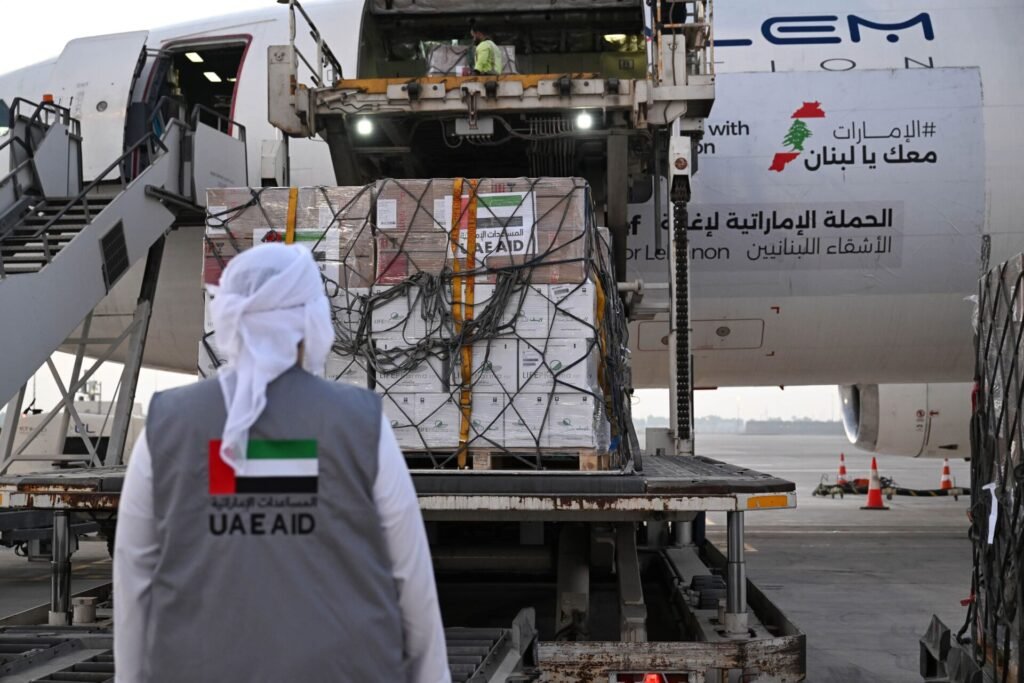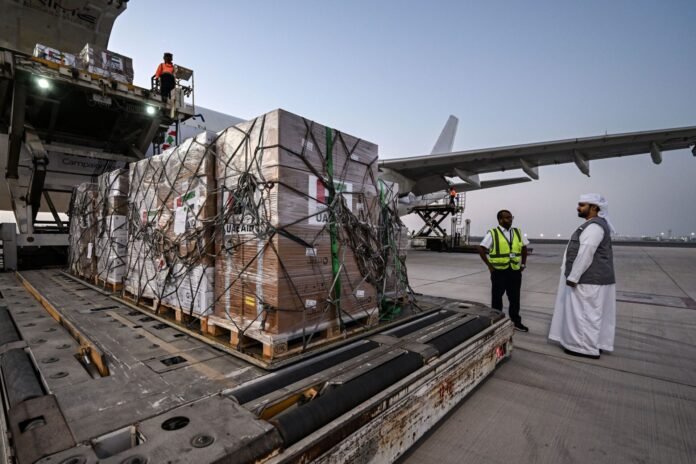Introduction to the ‘UAE Stands with Lebanon’ Campaign
The ‘UAE Stands with Lebanon’ campaign was launched in early October 2023 in response to the escalating humanitarian crises faced by the Lebanese population. This initiative underscores the United Arab Emirates’ commitment to providing support and relief to the country during its time of need. The campaign aims to address the urgent requirements of the Lebanese people, particularly given the numerous challenges they are currently enduring, including economic instability, food insecurity, and medical shortages.
Recognizing Lebanon’s plight, the UAE has taken a proactive approach by organizing a series of humanitarian flights, with the latest being the eighteenth aircraft dispatched to deliver vital supplies and assistance. Through this sustained effort, the UAE seeks not only to alleviate the immediate suffering of individuals and families but also to reinforce the foundations of resilience within the Lebanese society. The mission is designed to support critical sectors such as healthcare, education, and overall community wellbeing, thereby fostering a sense of security and hope for a brighter future.
The significance of the UAE’s assistance cannot be overstated. By actively engaging in international humanitarian efforts, the UAE reaffirms its position as a leading advocate for humanitarian aid within the region and beyond. The campaign represents a broader commitment to global solidarity, signaling to the Lebanese people that they are not alone in their struggle. In times of crisis, international cooperation and support are essential for recovery and rebuilding. The UAE’s contributions via the ‘UAE Stands with Lebanon’ campaign epitomize the spirit of generosity and compassion that transcends borders, embodying a commitment to humanitarian values that can unite us all during periods of hardship.
Details of the Latest Aid Delivery
The United Arab Emirates (UAE) has recently completed the dispatch of its 18th aircraft to Lebanon, marking yet another significant commitment to humanitarian aid in the region. This latest flight is carrying approximately 40 tonnes of medical supplies, aimed at addressing the urgent healthcare needs of the affected population. Among the supplies included are essential medical kits, surgical equipment, and pharmaceuticals, all of which play a critical role in supporting local health services striving to manage the ongoing challenges exacerbated by the current crisis.
The logistics of the aid delivery have been meticulously planned to ensure a seamless airbridge between the UAE and Lebanon. The aircraft, which departed from Dubai, arrived at Beirut’s Rafic Hariri International Airport after a carefully coordinated flight. The UAE government organized this mission in collaboration with various humanitarian organizations, facilitating effective on-ground delivery and distribution of these necessary supplies. Organizations such as the Emirates Red Crescent, in partnership with local NGOs, will handle the distribution, ensuring that these essential resources reach the most vulnerable communities across Lebanon.
This coordinated humanitarian response is integral to the broader relief efforts, as the continuous inflow of aid alleviates the pressure on local medical facilities. As the humanitarian situation evolves, the UAE’s involvement underscores its commitment to international cooperation and solidarity, aiming to provide timely assistance to those in dire need. Such deliveries not only address immediate health concerns but also bolster the overall framework of support in Lebanon, fostering an environment of hope and resilience amid adversity. The ongoing aid efforts represent a beacon of support for many, fortifying the spirit of community and partnership in times of crisis.
Leadership and Coordination for Humanitarian Efforts
The United Arab Emirates (UAE) has emerged as a significant player in global humanitarian efforts, with its leadership demonstrating a steadfast commitment to providing aid. This commitment is reflected in the directives issued by His Highness Sheikh Mohamed bin Zayed Al Nahyan and other top officials, who prioritize humanitarian missions as a core part of the UAE’s diplomatic agenda. Their vision not only encompasses immediate relief but also fosters long-term development in affected regions, particularly in crisis-stricken areas like Lebanon.
Under this leadership, the UAE has engaged in orchestrated efforts that emphasize the importance of collaboration with international organizations. For instance, the partnership with the World Health Organization (WHO), United Nations High Commissioner for Refugees (UNHCR), and the International Federation of Red Cross and Red Crescent Societies (IFRC) stands as a testament to the UAE’s comprehensive approach. These collaborations enhance the effectiveness and efficiency of humanitarian missions, ensuring that aid reaches those most in need while adhering to international standards and best practices.
The strategic coordination between UAE authorities and global organizations allows for the pooling of resources, sharing of expertise, and alignment of objectives. This collective approach not only amplifies the impact of UAE’s humanitarian efforts but also establishes a framework for sustained support to nations facing adversity. Such synergies ensure that the UAE’s aid is both timely and relevant, responding to the evolving needs of the communities in distress.
Moreover, the leadership’s proactive involvement in international forums and humanitarian networks exemplifies the UAE’s commitment to global solidarity. By driving forward this agenda, the UAE signifies its role as a responsible global actor dedicated to alleviating human suffering, fostering partnerships, and advancing the cause of humanitarian assistance worldwide.
UAE’s Historical Commitment to Humanitarian Causes
The United Arab Emirates (UAE) is distinguished by its rich heritage of humanitarian support, a commitment deeply rooted in the vision of its founding father, Sheikh Zayed bin Sultan Al Nahyan. This commitment transcends geographical borders, underscoring an unwavering philosophy of compassion and support for communities in distress. Since its establishment in 1971, the UAE has consistently prioritized humanitarian efforts, guided by the ethos that providing assistance is a paramount duty, irrespective of political or cultural differences.

Historically, the UAE has taken significant strides in addressing humanitarian crises across the globe. Notable efforts include responses to natural disasters, such as the 2004 Indian Ocean tsunami and the earthquake in Haiti in 2010. Each response exemplifies the UAE’s proactive approach, mobilizing resources and expertise to offer timely aid to affected populations. Furthermore, the establishment of specialized entities, such as the Emirates Red Crescent, has fortified the country’s capacity to execute humanitarian missions and create a structured methodology for delivering support.
In recent years, the UAE’s humanitarian endeavors have expanded, reflecting an increased commitment to international cooperation. Initiatives targeted at refugee assistance, medical outreach, and sustainable development highlight the multifaceted approach the UAE takes in its humanitarian engagements. The UAE’s response to the needs of the Lebanese people, particularly amid ongoing crises, emphasizes this dedication. It showcases a broader aspiration to elevate humanitarian standards and inspire collective action within the global community.
Looking ahead, the UAE remains resolute in its mission to provide continuous support to those affected by adversity. Through strategic partnerships and innovative programs, the nation is poised to adapt its humanitarian strategies to meet emerging challenges, reinforcing its legacy of compassion and global responsibility. This ongoing pledge signifies not only a historical commitment to humanitarian causes but also a dynamic vision for a future where assistance knows no bounds.


